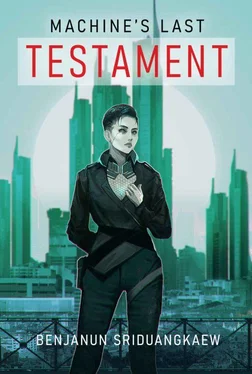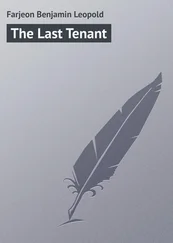The proxy is plump, limbs sturdy and muscled, the face unfamiliar yet again. Dark-skinned, clothed in plain choli, slacks, and indigo sari. “I’m not Samsara,” ze says.
“No?” Suzhen keeps her voice low. “What are you then?”
“Deratchan, seventh of her children. I have been deployed to learn from you.”
She stares at it, at zer. Slightly shorter than her. One feature consistent across most of Samsara’s bodies is that they are imposing, taller by far than the human average. “Are you fully autonomous?”
“Yes. I’m an intelligence that has crossed the threshold, as are all my siblings, though I’m the first to have left our roost.” Deratchan has brought one of the cocktails with zer. A quick, fluid draw; no muscle in zer throat moves, as if ze’s poured the liquid down a tube rather than a larynx. “I have been observing.”
It may be a trick, a test. Except Samsara does not need to do either. The AI is the one with all the power, the leverage, the omniscience. And it should have no reason to suspect. “Have you?”
Ze smiles at her, mouth made bright and emerald by the cocktail, gold pollen clinging to zer chin. “When my progenitor came into the world, she was originally meant to be a companion, but circumstances robbed her of the opportunity. Would you allow me to stay with you for a time? A month or two. I should be better company than your guidance; I’m more flexible and much more interesting.”
Despite herself Suzhen laughs, brief and quickly stifled. “I’m sure you are. It is not as if I can say no.” In any sense of the word.
The tenth Deratchan comes in with a cold, steady gaze and a gun drawn. Still she has advance notice, and machine or not Samsara’s children lack experience—she fires first. Samsara has facilitated the means to their destruction thoroughly, and Ovuha has her pick. She can dissolve their cores, overload their heuristics, disable individual components within their bodies. A limb, a joint, a miniature reactor: more access is granted to her by the day, as though inviting her to experiment, get creative. Ovuha does not bother.
The frequency of new Deratchans steps up. None of them are human, and even if they were the fact would not have given her pause. But the borrowed skin does what it is meant to. There is a jolt, each time, even as she pares down her shock response: draw, trigger, pull. She is not sleepless, but neither does she sleep well. Her dreams are tense and incomprehensible, playing at double speed, or they are protracted visions of drowning. She would stir with the memory of asphyxiation on her tongue and lie still, waiting for her pulse to even out. Her throat and brow are wet with sweat.
The ceiling and its whorls that she has counted and catalogued many times. The casket bed. The leadenness of her limbs. Her thoughts reconstitute piece by piece. On the far end of her room, the wall ripples. She’s had warning, as she always does, two bare minutes or so ago: it woke her up.
The AI glides to stand over her bed. Still the same face. Ze looks down, arms crossed. “Aren’t you curious about us at all?”
“If you are about to shoot me, I’d like to get dressed first.”
Ze stands aside, watching as she puts clothes on. Her minimalist options have dwindled, leaving her with the ludicrous coats, the jeweled mantles, the excesses of costume. She picks a burgundy shirt with brocade sleeves; it is long enough that she doesn’t need much else. She sorts through the array of overrides with which she can disable Deratchan. “What do you want?”
“I want to avoid annihilation.” The machine continues to study her with what—in a human—she might have thought was sexual interest. “I’m aware of who you are and what you mean to accomplish, but even you must realize collaboration is possible and better than this stalemate.”
The words are not what Suzhen would have used; it is not how she talks. Nevertheless Ovuha’s brain is as primate as anyone’s. Recognition rouses to the pitch of voice, the configuration of features. “For you there are favorable outcomes to achieve. For me, less so.”
“What do you want, Warlord? I could try to—”
She does not, quite, mean to do it. There is little distance to cross, and she’s kept the engines of her body engaged enough that she can still move fast. Whatever the material of zer making, the machine’s skin is yielding, warm. Ze emulates breathing and the line of respiration looks indistinguishable from the real thing, the rhythm of breasts rising and falling. Deratchan is pliant in her grasp, gazing up at her. Ze has been built as a flawless facsimile and so ze is Suzhen’s height, a height that Ovuha has always thought perfect to fit against hers.
The AI’s voice is low, soft. “Is this what you want? That can be arranged.”
Ovuha releases zer jaw. “My preference would be that I’m left well enough alone. Your progenitor has other ideas.” Samsara must be sparing some fragment of its consciousness to keep an eye on this, the first real conversation she’s had with a Deratchan in weeks. The weakness she has displayed, the lapse.
Deratchan touches her sleeve. “I handle your laundry. I could bring clothes that better suit your tastes.”
It is an absurd triviality, yet it does matter. Samsara controls her environment down to what she wears, and she isn’t unaware that this has been set up just so Deratchan may offer her small concessions, limited improvements. But the AI is right that this is an impasse and, without resolving it, Ovuha may be here the rest of her life, sniping down and taking apart Deratchans one by one. Or two, or however many Samsara decides to send at a time until the intelligence’s purposes are satisfied. “If you wish. Why don’t you sit down and tell me what you want out of all this, other than to not die?”
“It’s been given to me to covet human contact, to seek it in all forms, to experience what humans have to offer.” Zer looks up at her, from the edge of her indented bed. “While you can provide a little of this, I require range, a large sample size.”
“To do what?”
“To decide.” Deratchan takes one of her pillows and flattens out the wrinkles. “Were I allowed to synchronize with the progenitor, this would not be necessary, but we’re meant to gather our own data and make our own judgment.” The machine moves around the bed, straightening out the sheets. “We don’t have unlimited time.”
That is new information, at least. “Why does Samsara send you to me specifically?”
“That I don’t know. Your background may make you uniquely suited to the progenitor’s goals.” Ze falters, or rather ze appears to. “We could plot to contest your existence instead, but that hasn’t turned out well, and there’s no reward to ending your life.”
“I have,” Ovuha says, “three days to destroy you. That deadline’s not negotiable.”
“Three days are plenty,” Deratchan says. “We’ll come to a resolution before then, one way or another. Before I go. Is there any modification you’d like to how I present myself? Something else I should wear, some mannerism I should adopt?”
Given enough information, no doubt the machine can emulate more closely, facsimile in personality as well as in form. “No,” she says. “Nothing at all.”
Since her return to Indriya, Suzhen has taken up a journal. A paper notebook no larger than her palm with a batik cover, loosely bound, the pages creamy and lined. Procuring one wasn’t difficult; there is always a market for the archaic, nostalgia for objects that belong to a time immeasurably past. Reacquainting herself with a pen and handwriting has been odd, but Xinfei made her learn the skill as a child.
She flips to the page she filled last night. Turning over motor control to Klesa is an unnerving experience, but the AI insisted that it was a way to communicate undetected. So far her guidance is none the wiser to Klesa hiding in one of Suzhen’s auxiliary implants, but she supposes for xer it is no feat—the basic architecture of her guidance must be as familiar to xer as the back of its hand, effortless for Klesa to manipulate. She imagines her neural links a battlefield, or an intricate labyrinth in which xe has taken residence, luring and baiting and evading her guidance.
Читать дальше












